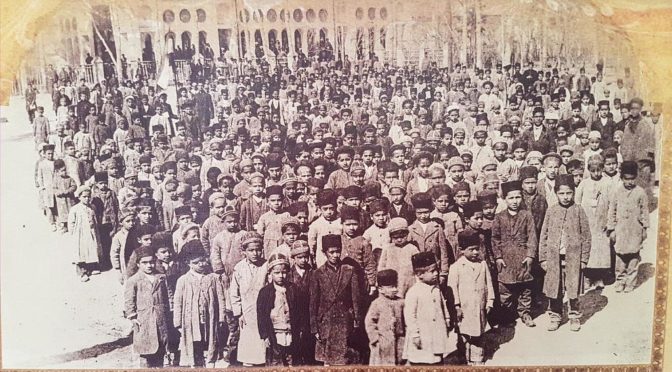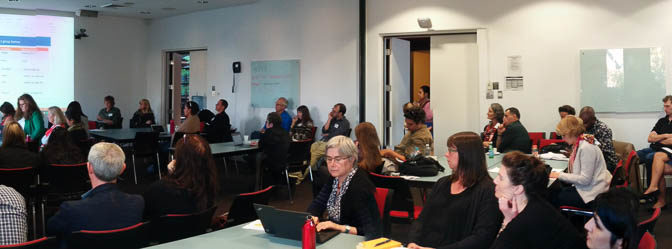Coming out in July 2019
This interdisciplinary book draws on voices from across the Global South and North to explore the epistemological and related methodological challenges and opportunities associated with researching South-South development cooperation, asking what these trends mean for the politics of knowledge production. Chapters are interspersed with shorter vignettes, which aim to share examples from first-hand participation in and observation of South-South development cooperation initiatives.
Tag Archives: southern theory
The global South is changing how knowledge is made, shared and used
In the past few decades, there’s been more critique of global knowledge inequalities and the global North’s dominance.
News of an important new contribution to southern theory edited by Fran Collyer, João Maia, Raewyn Connell and Robert Morrell.
Source: The global South is changing how knowledge is made, shared and used
Criminology, Southern Theory and Cognitive Justice
 In the contemporary world of high-speed communication technologies and porous national borders, empire building has shifted from colonizing territories to colonizing knowledge. Hence the question of whose voices, experiences and theories are reflected in discourse is more important now than ever before. Yet the global production of knowledge in the social sciences is, like the distribution of wealth, income and power, structurally skewed towards the global North. This collection seeks to initiate the task of closing that gap by opening discursive spaces that bridge current global divides and inequities in the production of knowledge. This chapter provides an overview of criminologies of the global periphery and introduces readers to the diverse contributions on and from the global South that challenge how we think and do criminology and justice.
In the contemporary world of high-speed communication technologies and porous national borders, empire building has shifted from colonizing territories to colonizing knowledge. Hence the question of whose voices, experiences and theories are reflected in discourse is more important now than ever before. Yet the global production of knowledge in the social sciences is, like the distribution of wealth, income and power, structurally skewed towards the global North. This collection seeks to initiate the task of closing that gap by opening discursive spaces that bridge current global divides and inequities in the production of knowledge. This chapter provides an overview of criminologies of the global periphery and introduces readers to the diverse contributions on and from the global South that challenge how we think and do criminology and justice.
Source: Criminology, Southern Theory and Cognitive Justice | SpringerLink
End of the South?
The postmodernist epistemological challenge to ‘the Enlightenment’ — its attack on master narratives and its critique of truth — also loses its liberatory aura when transposed outside the elite intellectual strata of Europe and North America. Consider, for example, civil war in El Salvador, or the similar institutions that have been established in the post-dictatorial and post-authoritarian regimes of Latin America and South Africa. In the context of state terror and mystification, clinging to the primacy of the concept of truth can be a powerful and necessary form of resistance.
(Michael Hardt & Antonio Negri Empire Cambridge, Mass.: Harvard University Press, 2001, p. 155)
Postscript
The call from South symposium – Slow down!
The Epistemologies of the South symposium was held at Sydney University on 14 April. It received an extraordinary response. Some of the sessions were standing room only.
The event was convened by Raewyn Connell and Fran Collyerto bring together of scholars in the social sciences interested in the status of knowledge production in the South. The morning included brief presentations from Maggie Walter, Vera Mackie, Helen Gardner, Devleena Ghosh and myself. We also heard from those involved in the Arenas of Knowledge project (João Maia, Robert Morrell, Vanessa Watson, Patrick Brownlee and Beck Pearse), a collaboration between Brazil, South Africa and Australia to map social science publishing in the South.
The rest of the day involved group sessions and plenaries where experiences of working in the South were shared. “Speaking bitter thoughts” was encouraged as a way of understanding the experience of working in the university environment, particularly for indigenous peoples (this reflected the People’s Tribunal in Melbourne).
There were many interesting discussions about the knowledge terrain of the South. The universal nature of English in scholarly publishing was seen by many as inevitable, but it was felt that there should be more allowance for the difficulty faced by second-language speakers and for concepts that were not easily translated. The economic challenge for poorer Southern countries of subscribing to scholarly journals was also mentioned. While there are Open Source alternatives for publication, the unpaid labour in maintaining these needs recognition as part of academic work.
More generally, there was broad discussion about the overall framework of knowledge production. The accepted capitalist model of knowledge accumulation through data extraction and publication output was questioned. This seemed to leave little time to reflect on what is learnt. It also does not accommodate indigenous practices, which focus more on the reproduction of knowledge as a form of stewardship. Reflecting the work of Unaisi Nabobo Baba on silence, there was discussion about the importance of listening as a scholarly modality. Overall, there was a feeling that knowledge in a southern context should involve a quality of slowness that engages with the social relations at play.
Raewyn Connell felt the event had fulfilled its aims:
I was very pleased at the way the national symposium brought together different generations of scholars, and people working in different traditions of knowledge and thought. Good discussions went on right through the day, and I’m hopeful that many links have been made that will energise this major re-thinking of social knowledge.
Critically, the symposium resolved to establish a mailing list so that the participants can organise future events that will continue these conversations. It will be interesting to see how these conversations develop. The academic machine offers a ready-made system for accumulating knowledge in professional journals. How might an archive of southern knowledge be designed?
Southern Criminology
Researchers from Queensland University of Technology have recently applied a southern perspective to the administration of justice.
Issues of vital criminological research and policy significance abound in the global South, with important implications for South/North relations and for global security and justice. Having a theoretical framework capable of appreciating the significance of this global dynamic will contribute to criminology being able to better understand the challenges of the present and the future. We employ southern theory in a reflexive (and not a reductive) way to elucidate the power relations embedded in the hierarchal production of criminological knowledge that privileges theories, assumptions and methods based largely on empirical specificities of the global North. Our purpose is not to dismiss the conceptual and empirical advances in criminology, but to more usefully de-colonize and democratize the toolbox of available criminological concepts, theories and methods. As a way of illustrating how southern criminology might usefully contribute to better informed responses to global justice and security, this article examines three distinct projects that could be developed under such a rubric. These include, firstly, certain forms and patterns of crime specific to the global periphery; secondly, the distinctive patterns of gender and crime in the global south shaped by diverse cultural, social, religious and political factors and lastly the distinctive historical and contemporary penalities of the global south and their historical links with colonialism and empire building.
Source: Southern Criminology
A different kind of difference
From McKinnon, Katheran. 2013. “A Different Kind of Difference: Knowledge, Politics and Being Antipodean.” Dialogues in Human Geography: Commentary.
“Perhaps an ‘Antipodean’ identification is a way of capturing, valuing and placing at the centre the deliberate effort to look at the world from the ‘underside’.
Source: A different kind of difference
Raewyn Connell anti-inaugural lecture, 5 Sept 2014
Raewyn Connell exits official academic life with a powerful message. But, she will continue to be active in the growing network of sociology in the South.
Raewyn Connell anti-inaugural lecture, 5 Sept 2014 – YouTube.
Theories of the South: Limits and perspectives of an emergent movement in social sciences
Theories of the South: Limits and perspectives of an emergent movement in social sciences.
Brazilian sociologist Marcelo Rosa has published an important critique of social theory (download), comparing the approaches of Boaventura de Sousa Santos, Jean and John Comaroff and Raewyn Connell. Though he singles out Connell as an approach that allows for alternative southern voices, he concludes from their differing uses of theories an inconsistency in the notion of ‘southern theory’. In reference to the French sociologists Boltanski and Chiapello, he describes this use of south as a ‘circumstantial project’. As such, Rosa is vulnerable to the same critique he has levelled at others in marginalising southern perspectives by contrast to northern theory. Diversity of approaches does not necessarily imply contradictions in the field. They can indicate a dynamic argument that is activating an alternative field of inquiry.
On the dangers of ‘reverse essentialism’
While Southern Theory continues to grow, there is a danger that it develops insulated from critique. There is the risk that its political mission focuses exclusively on distinguishing a separate form of knowledge from the dominant north, repeating the kind of denial of southern roots prevalent in the North.
A recent article by Gregor McLennan from University of Bristol offers a critical appreciation of Southern Theory:
Sociology is often pitched as the social science discipline most obviously in need of postcolonial deconstruction, owing to its ostensibly more transparent Eurocentrism as a formation. For this reason, even postcolonial scholars working within the ambit of sociology are reluctant to play up its analytical strengths in addition to exposing its ideological deficits. Without underestimating the profound impact of the growing body of postcolonial theorizing and research on self-reflexivity within sociology, this paper points up some key ways in which the structure of comprehension within postcolonial critique itself is characteristically sociological. Alternatively, if that latter conclusion is to remain in dispute, a number of core epistemological and socio-theoretical problems must be accepted as being, still, radically unresolved. Consequently, a more dialectical grasp of sociology’s role within this domain of enquiry and style of intellectual politics is needed. I develop these considerations by critically engaging with three recent currents of postcolonial critique – Raewyn Connell’s advocacy of “Southern Theory”; the project of “reinventing social emancipation” articulated by Boaventura de Sousa Santos; and the “de-colonial option” fronted by Walter D. Mignolo.
He cites Santos’ caution against a simplistic North-South binary:
[Santos’] accepts that the register of South versus North, East versus West is a metaphorical one that, while effective as a ‘‘defamiliarizing’’ tactic, runs the risk of a sloppy reverse essentialism in which Europe and its traditions are treated as a ‘‘monolithic entity’’.
We are left with a challenging question. If we accept that the North-South division is indeed a generalisation, then what is its remaining meaning? It is possible to lay a similar charge with many oppositions, such as male-female, human-nature and capital-labour. The criticism doesn’t invalidate the opposition, but does caution against an essentialist reading of geopolitics. The opposition needs to be understood as a ongoing construction that is critically relevant to cultural trajectories, rather than something that occurs automatically when we cross the equator.
Reference
Gregor McLennan (2013), Postcolonial Critique: The Necessity of Sociology, in Julian Go (ed.) Postcolonial Sociology (Political Power and Social Theory, Volume 24), Emerald Group Publishing Limited, pp.119-144

